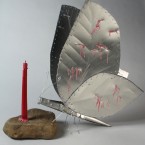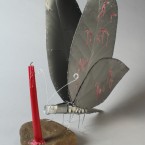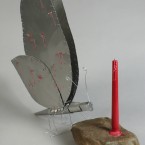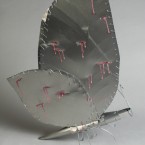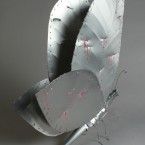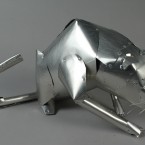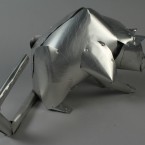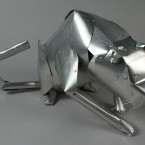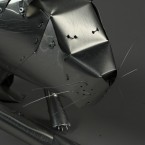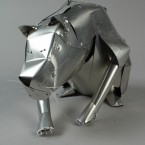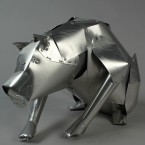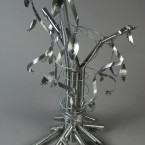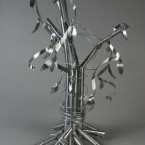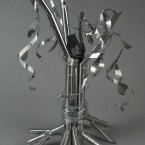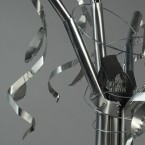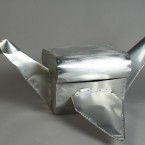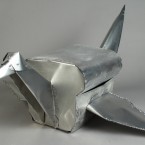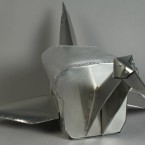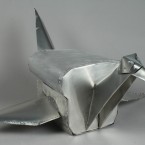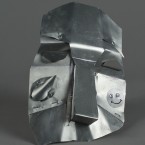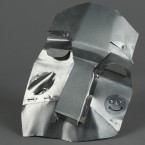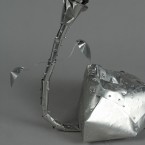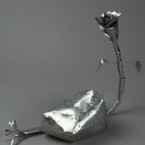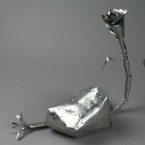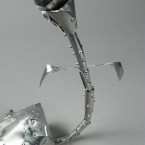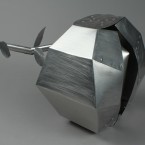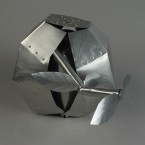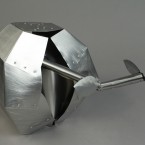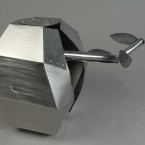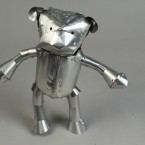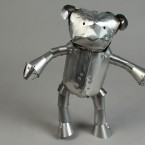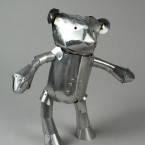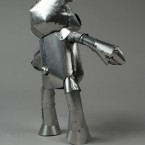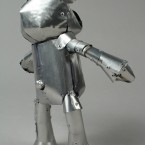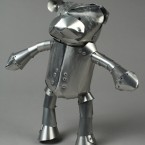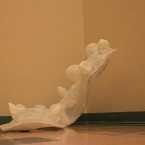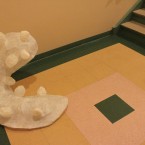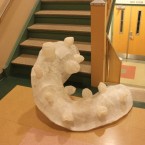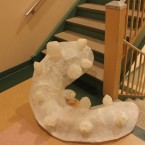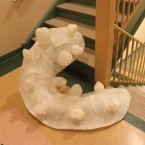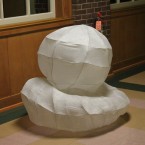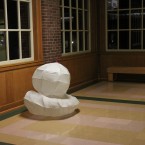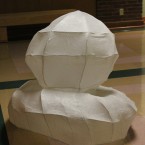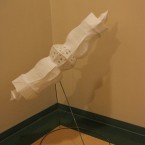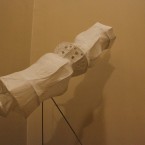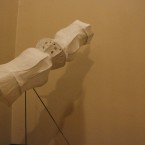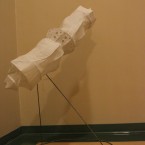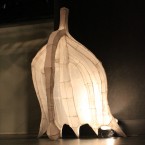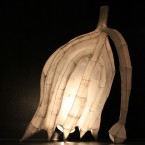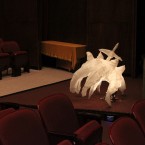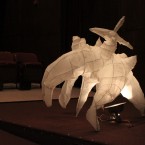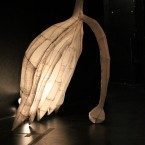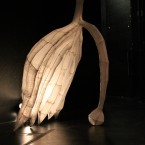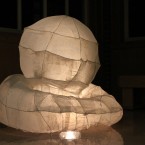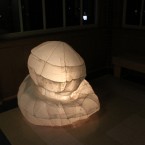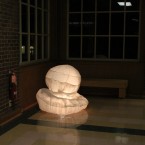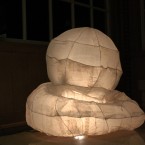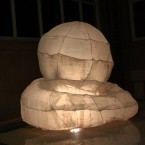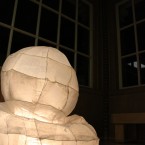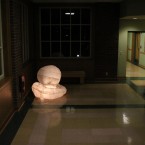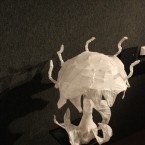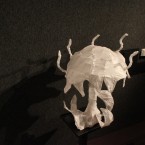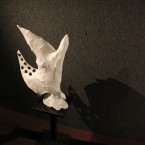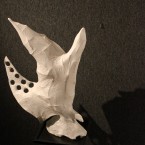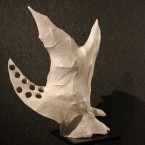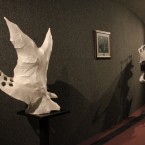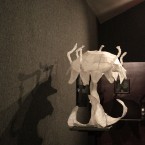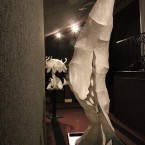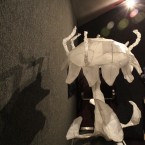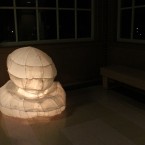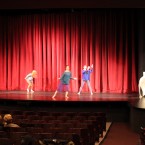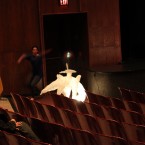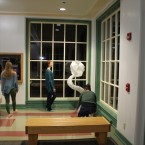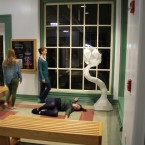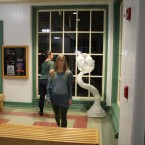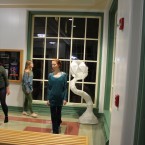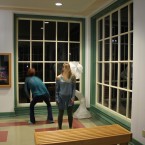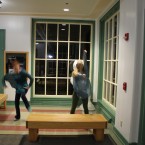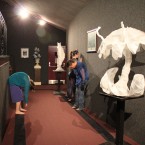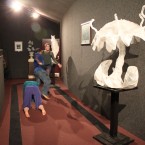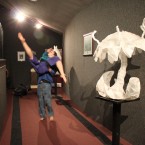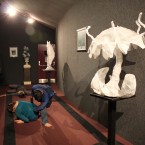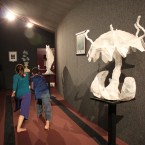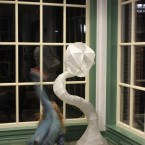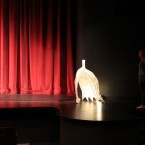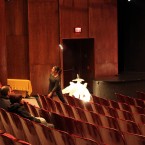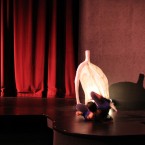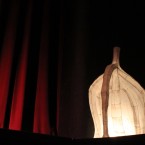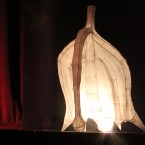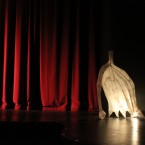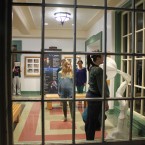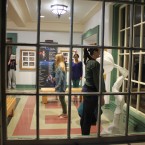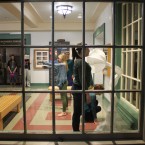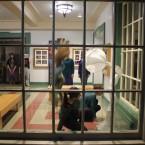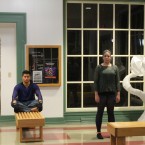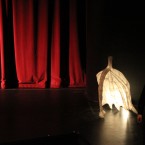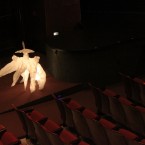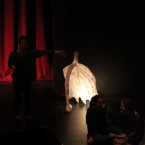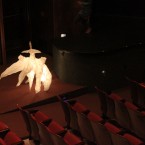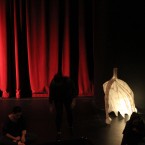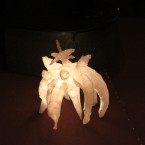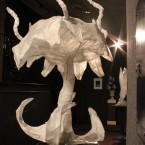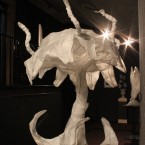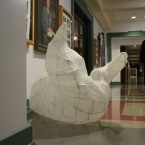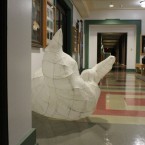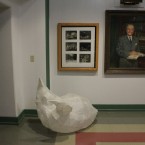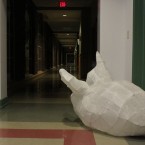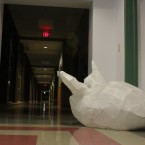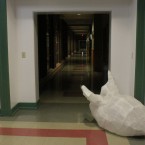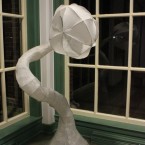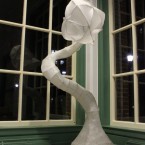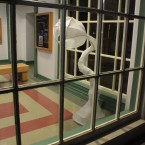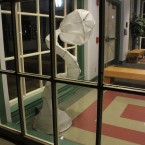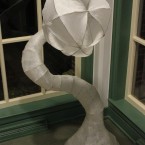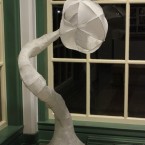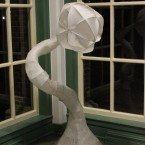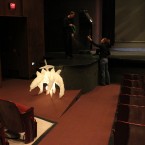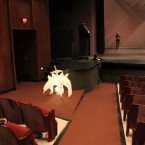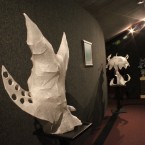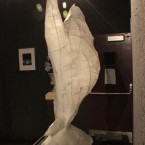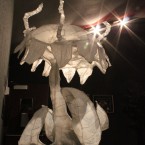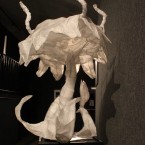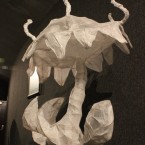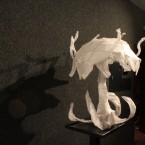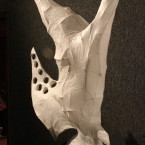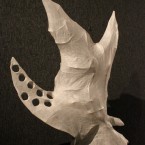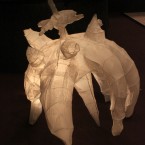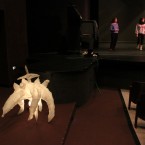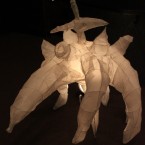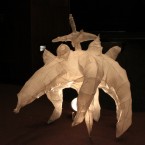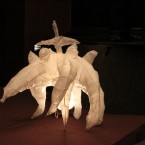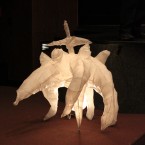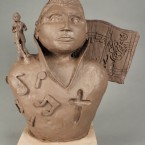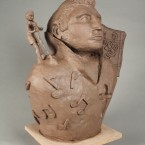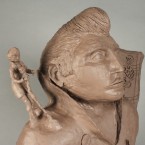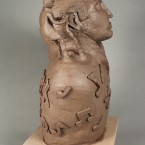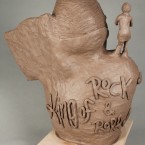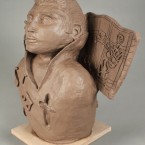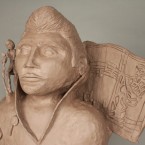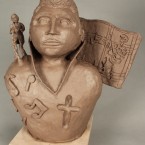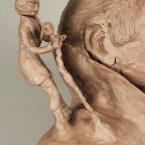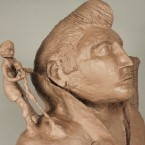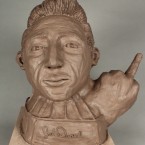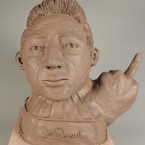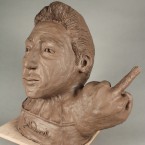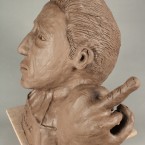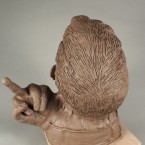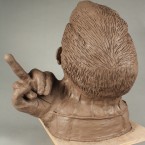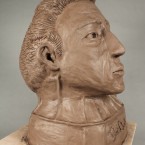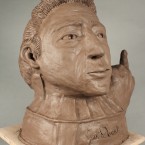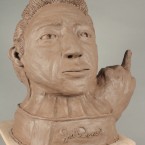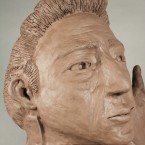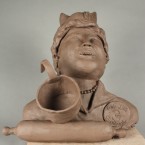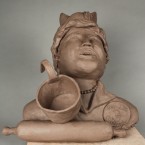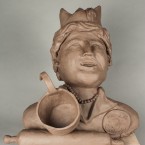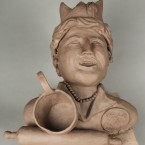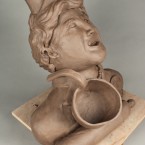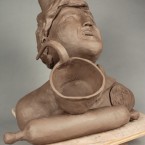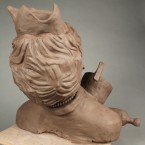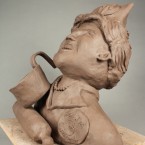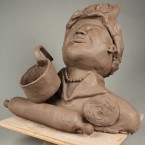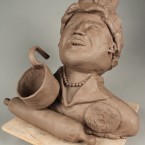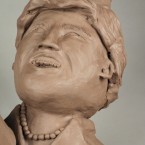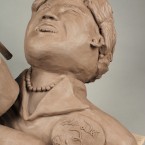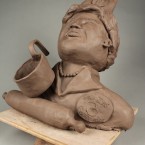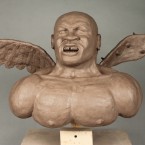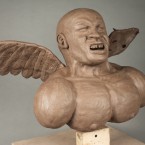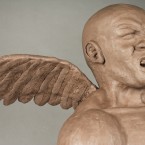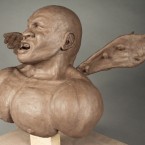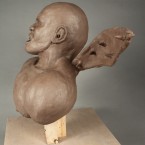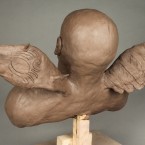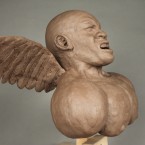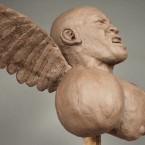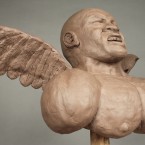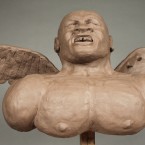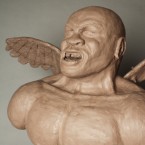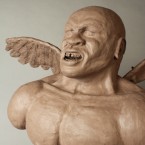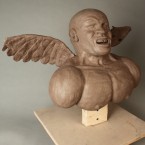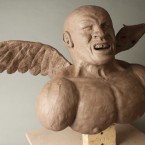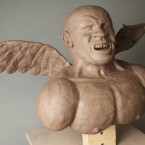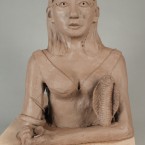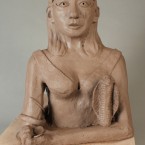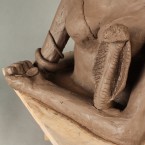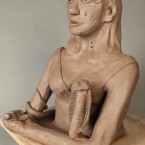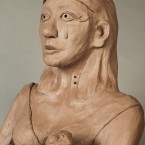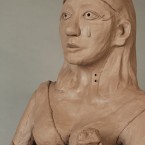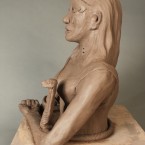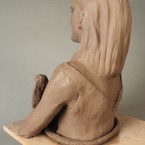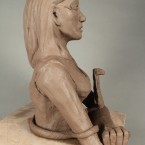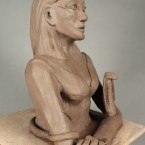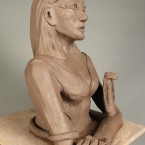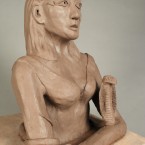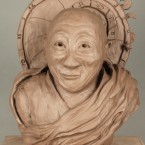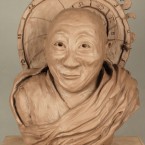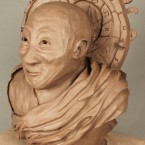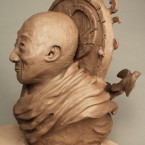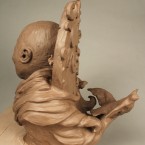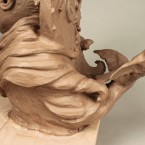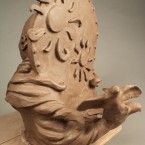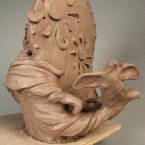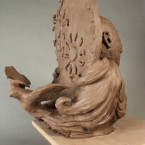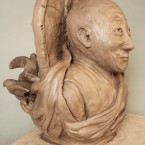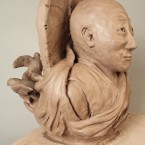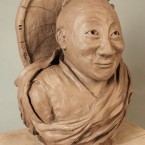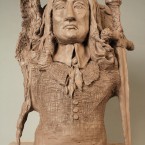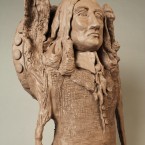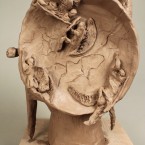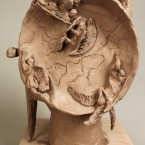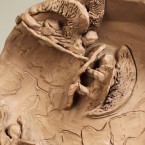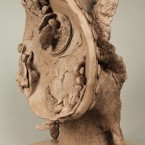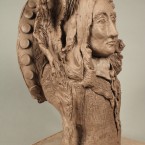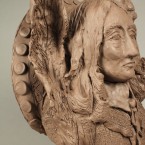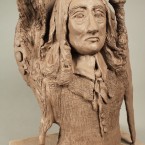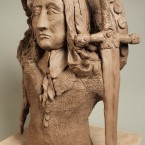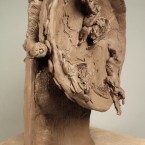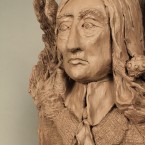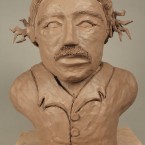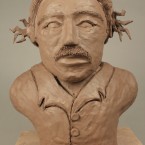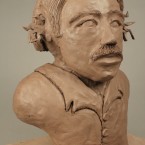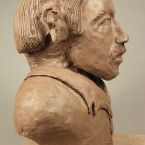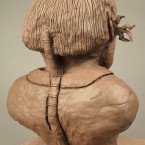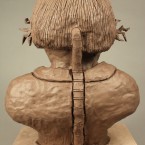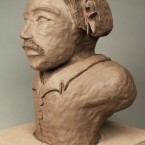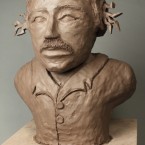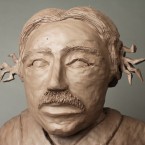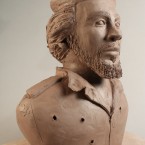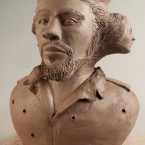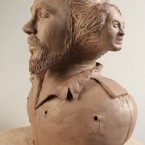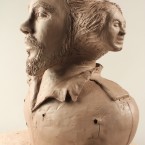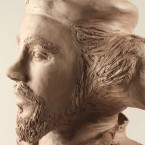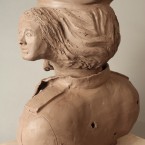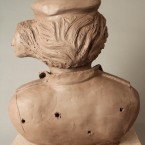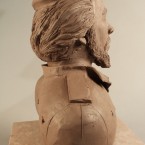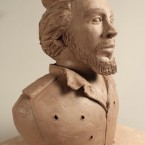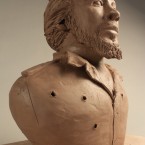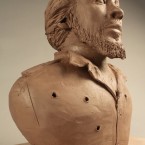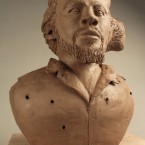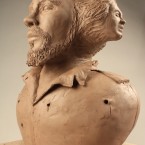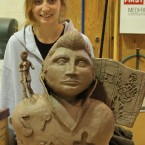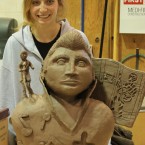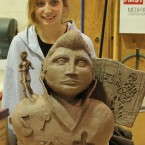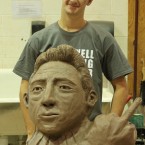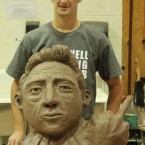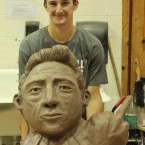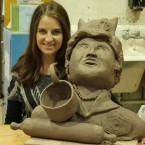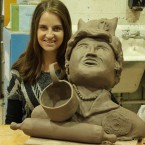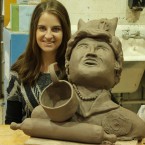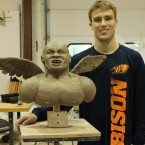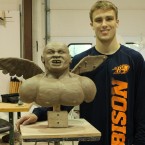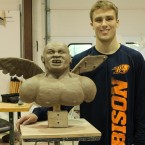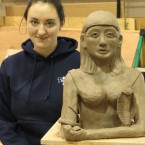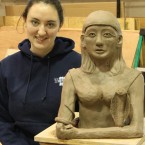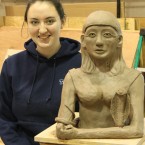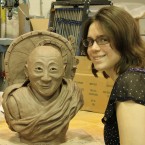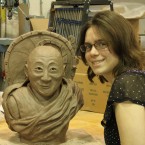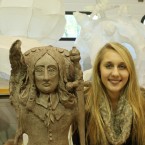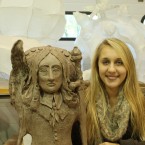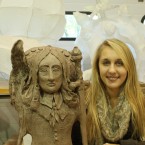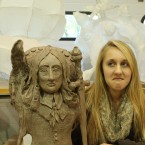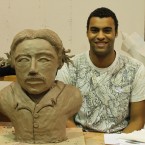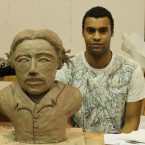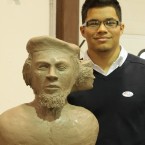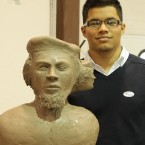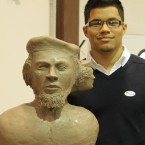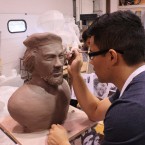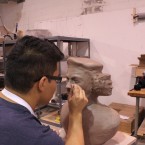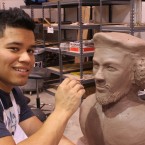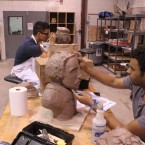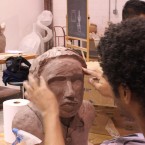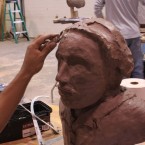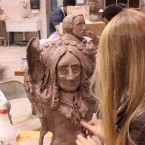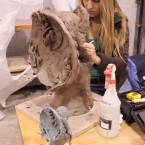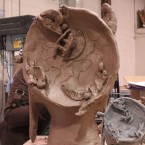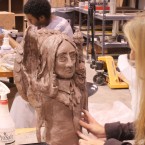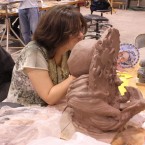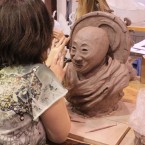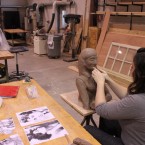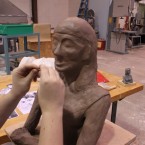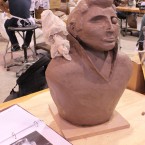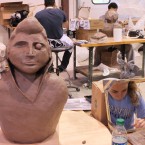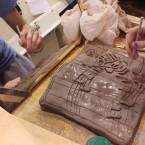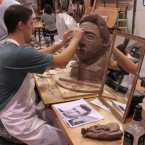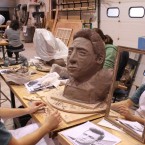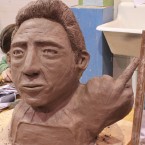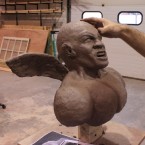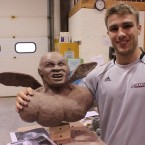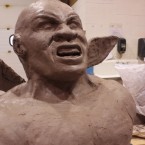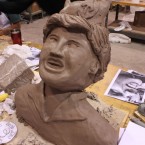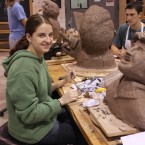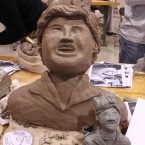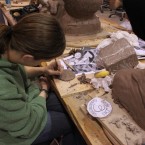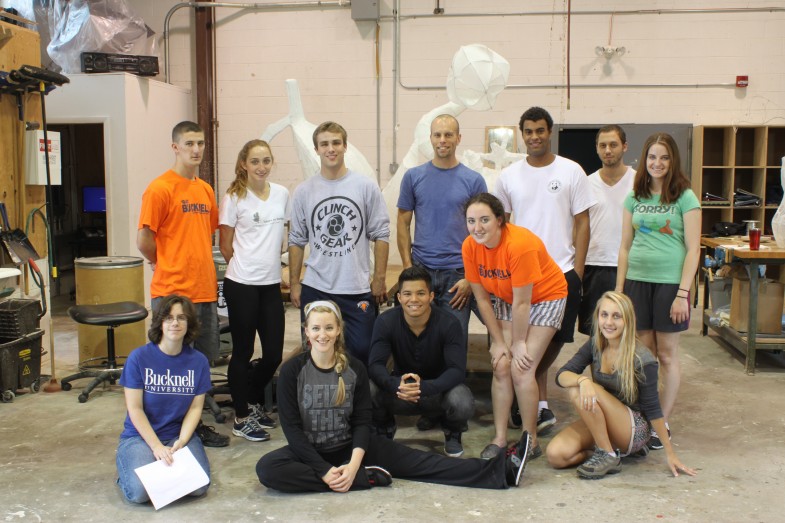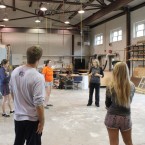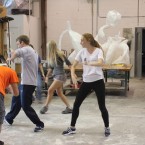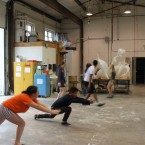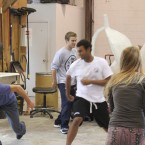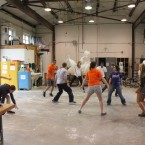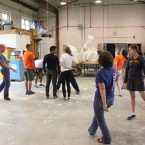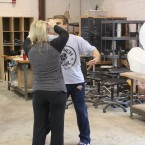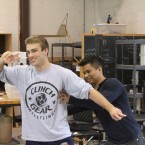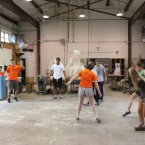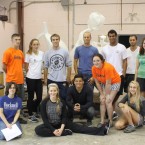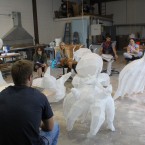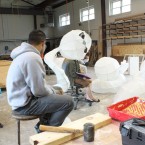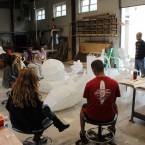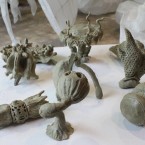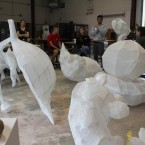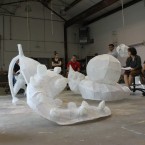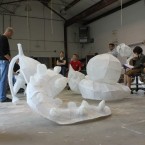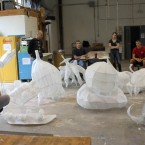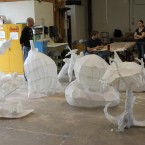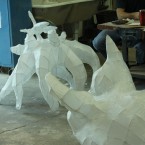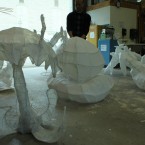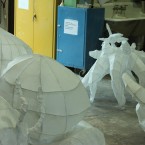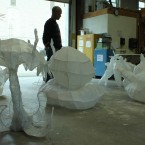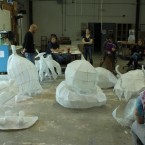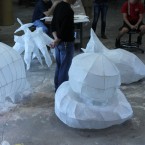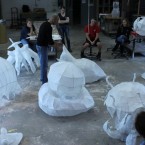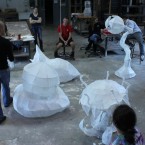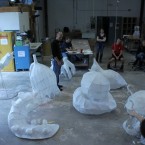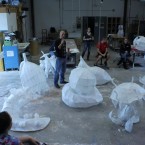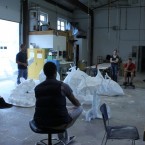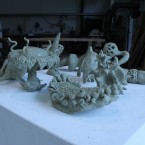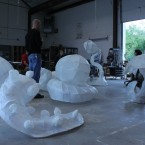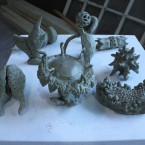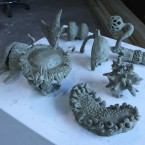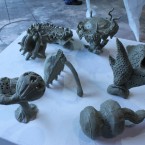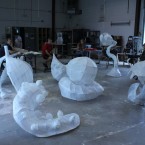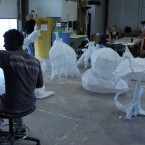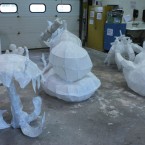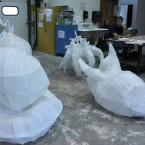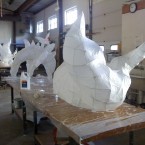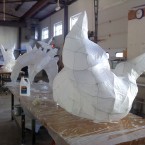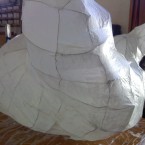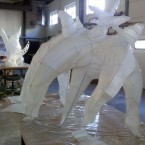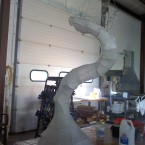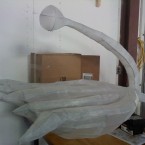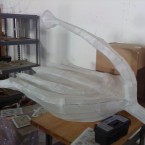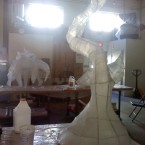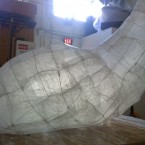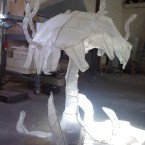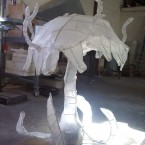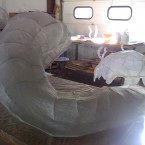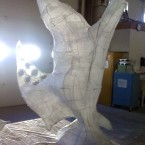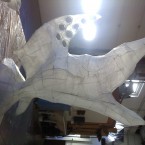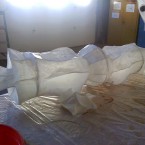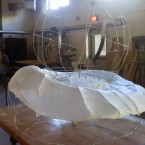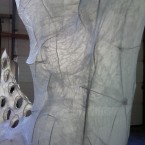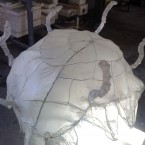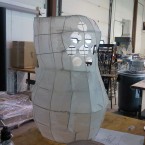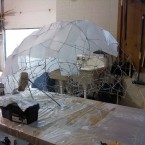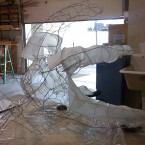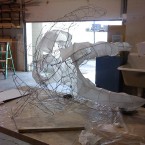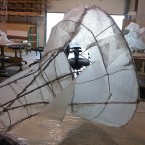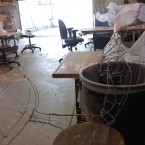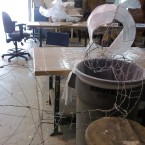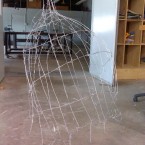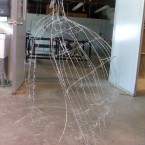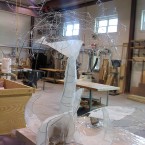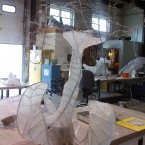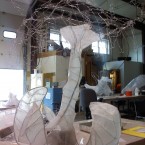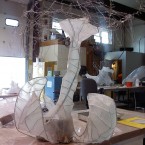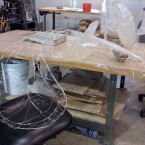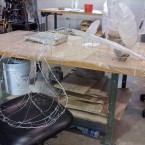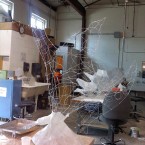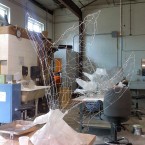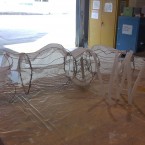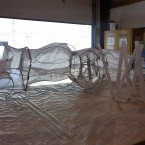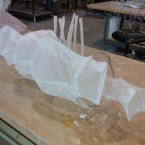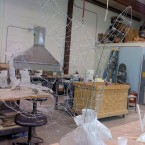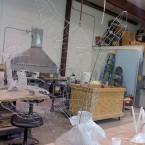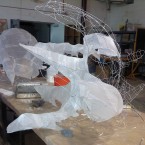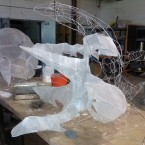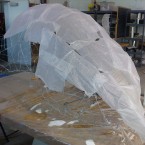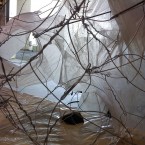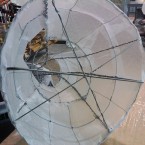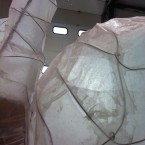Tag: Fall 2012 Projects
Radiolarian Pre-Performance Shots
Radiolarian Rehearsal Performance
Bust Photo Shoot
Students With Their Projects
Progress Shots of Busts
Casey Dunne
I have chosen to sculpt the bust of Cleopatra. She has always interested me because of her beauty and mystique. I love the eroticism of her facial features and the story behind her. Not only was she one of the most powerful women in the world, but also one of the first.
I really admire Cleopatra. I think that what she did to save Egypt is amazing and not many people would have been able to do it. She was an early feminist and wielded power higher than that of most men. I also really admire her wit. Not many women would be smart enough to romance both Caesar and Antony in order to save their country.
A great ruler, a great mother, and a beautiful woman, Cleopatra is best known for being the last and best Queen of Egypt. She took the rule from her brothers through using Caesar’s power. She then got Egypt the protection of Rome while still remaining in control of Egypt. She also was known for being very beautiful and having many lovers. But she loved all of her children equally. Caesarius, her son with Caesar is her most known child, but she also had two children with Antony after Caesar’s death, which she loved greatly.
As I learned about Cleopatra I became very interested in her death. Cleopatra committed suicide through the bite of an Egyptian Cobra. I was surprised to learn that this cobra was in fact not just any snake but had been Cleopatra’s “pet” for years. Cleopatra apparently told her Cobra of her despairs and asked him to relieve her of life. Her Cobra then ever loyal to Cleopatra’s wishes bit her and she died.
I learned about Cleopatra’s fascination with jewelry, snakes, and men. Cleopatra was not afraid to embrace her sexuality and have men whenever she wished. She had her pet Cobra but was always interested in worshiping snakes and she believed them great protectors. She adorned herself with gold jewelry and is known for her fashion. However despite all of this, she was often sad because she felt that something was missing from her life. She was too passionate for her own good.
I want to portray Cleopatra’s tragic death through the snakebite, and perhaps her Cobra himself. I also want to somehow show her passion and her power. Perhaps holding Caesar himself in the palm of her hand. All things considered, I really want to show the power and beauty she is so famous for.
Nicholas Tesla – Steven Fabiano
The person I have chosen is Nicholas Tesla. The reason is that he is one of the most influential people in modern science, and has contributed so much to modern scientific knowledge.
I strongly admire Tesla as an individual because of his sheer love for the scientific pursuit. He never worried about financial gain as a purpose for discovery, and was actually extremely poor and frequently homeless.
He is best known for his work with high-voltage electricity and his development in X-ray technology. Both of these advancements are used today in medical fields as well as business and recreation. He is also known to have a photographic memory, OCD, and for being celibate his entire life.
Through my sculpture I want to communicate the pure drive Tesla had for science, and the disregard he had for other aspects of life. I want my sculpture to fully embody his drive for knowledge and advancement.
Alexandra Lamancusa: The 14th Dalai Lama- Tenzin Gyatso (previously Lhamo Dondrub)
I selected the 14th Dalai Lama because I am moved by his philosophies on kindness and by his life story. I happened to meet him last summer in D.C. while he was blessing the Potomac River, so I also have a personal connection to him. I admire his ability to address all people regardless of background and his ability to find joy in life, regardless of what life has handed him.
It’s fascinating to imagine growing up while being told that you are and have been for centuries this spiritual teacher destined to lead an entire people. I can’t help but wonder what I would think if I were in his shoes.
He has a doctorate in Buddhist philosophy. I didn’t know that was required (I would assume that was part of the job description). He was taken from his home at the age of four.
His oldest brother was also identified as another reincarnation or a lesser lama, so he was not alone when he was taken to Lhasa, the city of the monks in Tibet.
I appreciate his humor and that he’s always smiling. When I met him on the Potomac, he switched out his ceremonial headdress for a baseball cap. He’s such an interesting combination between historical and modern.
He also has special meaning and significance to me because my grandpa also really enjoys his teachings. It’s nice for us to chat about new things the Dalai Lama has said or things we have read!
He’s interested in looking at how meditation can affect the brain.
He also happens to be a Nobel peace-prize winner, if everything else wasn’t enough to make him famous and awesome
He enjoys repairing watches. Who knew?
What do I want to express with this bust? I guess perhaps I want to show the conflict between being an individual and a political/spiritual leader. I could talk about his personality (maybe through hats…). I really want to look at how he is hi sown individual and yet at the same time this prominent political and spiritual figure.
Kim Nagotko – Project 2 Writing Assignment: Elvis Presley
For the Must Bust project, I choose Elvis Presley. I selected him because he is a true legend in the world of rock and roll. His songs are timeless along with his impact of society. I believe he is a beautiful man with a stunning voice and inspiring life. I admire Elvis Presley deeply. I am motivated by his ambition and courage to step out of the box and push the lines of socially acceptable in a time that was very closed minded. I love how he influenced a nation to change and was an inspiration for future musical artist such as the Beatles. Elvis Presley is best known as a singer who drove girls wild with his hip-shaking dance moves. He also acted in several movies and was featured in many television specials. While I was learning about Elvis’ life, I found out that he was awarded The Grammy Lifetime Achievement Award at age 36. Most people receive this award after decades of being in the business if they receive it at all. Elvis was able to accomplish this amazing feat after only 16 years.
Elvis Presley had a lot of interesting idiosyncrasies. For one, he had a signature flip in his hair that became the model for any male who wanted to appear “cool” during the 50’s. He is also undoubtedly known for his behavior on stage in which he would shake his hips from side to side and move his legs in response to his hip movement. Another thing that I found really interesting was that Elvis was very religious and learned how to sing by singing gospel music. He kept his religious beliefs throughout his life and incorporated it in all he did. I think this is really funny because it contrasts everything that older folk of his time said about him
There are a few aspects about Elvis that I really want to communicate through my work. Despite what anger adults said about Elvis, he valued being home with his family and his Christian beliefs over most things. I believe this is a really important aspect to communicate because people get lost in his mannerisms and against the norm style that they think he was someone who got lost in fame but he really wasn’t. At his core, he always valued being home and everything that went with it. Aside from a deeper look at Elvis, I want to show-off his talents as well. He is famous for his singing and therefore should be commemorated for this talent. It is also important to communicate this aspect through the piece because his songs and voice are timeless and when people think of Elvis, they think of a singer.
Angel Hernandez Proj 2 ‘Che’ Guevara
The historical figure I selected is Ernesto “Che” Guevara. He was the first person that came to my head when I heard the assignment so I figured I should go with my instincts. Che Guevara was an Argentine Marxist revolutionary. He is best known for his participation in the Cuban Revolution with Fidel Castro.
I learned about Che Guevara a very long time ago and I’ve always had conflicting sentiments about him. I admire the reasons why he decided to start a revolutionary movement but I disagree with some of the decisions and actions he did near the last days of his life. At a young age he traveled around Latin America where his experiences and observations led him to conclude that the region’s ingrained economic inequalities were an intrinsic result of capitalism, monopolism, neocolonialism and imperialism, with the only remedy being world revolution.
Now that I went back to do research on him I was surprised to find out about his intellectual and literal interests. Che was a fan of chess from a very young age. His father taught him how to play and by the time he was 12 he was already competing in national tournaments in his native land of Argentina. He was also a fan of literature like works from Pablo Neruda, Federico Garcia Lorca, and John Keats. Apparently the library at his house had over 3,000 books.
Through this sculpture I want to be able to show Guevara’s spirit. He was a revolutionary, a man of courage and determination. I want to be able to capture that conflicting look that most of his pictures have. A look that indicates a mind in struggle for finding peace in a chaotic world. I believe such determination and struggle is what represents Che Guevara. What on earth could cause a spark on a man and would lead him to ignite a fire so big and overwhelming that could change the political structure of nations? -That I what I wish to capture.
Project 2 Writing Assignment–Ellie
For my historical figure I have chosen to sculpt Julia Child. I really enjoy cooking and watching cooking shows, but I have never actually watched any of Child’s many television series. I knew of her spunky personality and her ability to relate to many novice cooks, which made her an inspiration to thousands of home cooks and for my piece. I think Julia Child is extraordinarily admirable for being able to chase a deep passion she discovered on a whim. What I’ve noticed over the years is that most master chefs are men, the paradox being that women are expected to do the cooking for her household. Child broke this barrier by being not only a famous female chef but also by being the first host of a television cooking show. In addition to being a memorable TV persona for almost 30 years, Julia Child has written multiple cook books which have come to be regarded as a sort of scripture in the culinary community.
While researching Julia Child, I discovered that during WWII she served in the Office of Strategic Services (OSS), after being rejected from the Women’s Army Corps for being too tall, which I thought was a very strange requirement for non-combat workers. She became a covert operative of sorts and worked on top secret research projects for the army.
In my sculpture I want to portray both the open, bubbly life Child led as a cooking TV legend as well as her clandestine past. I think Child’s life was dictated by many whims, which led her to be very successful and iconic, and I really look up to her adventurous and courageous lifestyle. Her work inspired thousands of people to start cooking and started a new movement of television. I want to show both the unexpected spy with the well-known cooking star.
Alana Jajko
John Milton was an English poet, who wrote throughout the 1600s during a time of religious change and political disruption. Due to these issues, much of his poetry and prose reflects deep personal convictions, a passion for freedom and self-determination, and the urgent issues and political turbulence of his day. His epic poem, Paradise Lost, especially touches on this determination and yearning for freedom, in both form and content. While the story itself revolves around Satan and his rebellion against servitude beneath God, on another level, Milton risks rebellion as well with this new take on interpreting the Bible through poetry, especially during a time of religious flux. The meter which Milton chooses to use also breaks all traditional conventions and restraints of poetry. He writes in “blank verse,” employing enjambment, inserting pauses in the middle of lines, omitting words deemed unnecessary, using one part of speech for another (i.e. adjectives as verbs, verbs as nouns, etc.), applying the inversion of stresses and natural word order, inserting unusual vocabulary from Greek or Latin, the list goes on and on. In breaking all norms of traditional writing, he essentially creates his own style of poetry, now known as “Miltonic verse.” So, while Milton creates his own writing style and suggests freedom from religious standards during an age where there was much doubt revolving around religion (the so-called Age of Reason), he also may be commenting on the Restoration in England, a return to monarchy. This is suggested in the way he presents God and his angels and Satan and his fallen comrades, the former being the power of the monarchy and the latter being the uprising of a disgruntled lower class. Thus, Milton makes very bold moves by encompassing in Paradise Lost several delicate subjects, breaching tradition, religion, and politics.
I really admire Milton for his independent spirit, confidence in commenting on subjects of conflict, and ability to use words in such a passionate way. His descriptions in Paradise Lost evoke a range of emotions and capture imagery so vividly that I actually feel empowered upon each reading. His words incite feelings of sympathy, vengeance, rage, and perseverance, to an extent where Milton is able to humanize Satan to a point where the reader actually feels compelled to side with Satan, the iconic “bad guy.” In my sculpture, I hope to communicate the power of Milton’s words in his epic poem, as well as the sense of rebellion and freedom which is embraced on two levels, one through Milton himself and his commentary on the world, and the other through the portrayal his characters in Paradise Lost.
Eric Schroeder
For my project, I would like to create a bust of the singer-songwriter Johnny Cash. Cash is best known for his music that spans the genres of country, rock ‘n roll, and gospel and his imposing, deadpan baritone voice. His songwriting ability has allowed him make music that is story-based, humorous, emotionally moving, dark-themed, and generally just fun to sing along with, all at the same time. For this reason, his appeal has lasted for generations. He is one of very few artists that have connected the gap in music taste between my grandparents, my parents, and myself.
The infamous personal life of Johnny Cash has been well-documented as well. Throughout his career and personal life, Johnny Cash had struggled with alcoholism and drug abuse problems, which attributed to the outlaw image he is known for. He had faced unimaginable lows in his life, losing the support of those who were close to him, and nearly overdosing on several occasions. He fought these problems for many years, and was finally able to overcome them with the help of God. The story of his redemption and acceptance of God in his life is one of the things I admire most about him. Nothing could keep Johnny Cash down.
One of the ideas I think is very important to communicate with this piece is the contrast of Johnny Cash’s outlaw image and inner demon with his revival. Redemption was always a theme that was very important to him and needs to be conveyed somehow. Some other details that could be included is his signature phrase, “Hello, I’m Johnny Cash”, that he would introduce himself with at every performance. He also wore black almost exclusively, earning him the moniker “The Man in Black”, representing how he wanted to take the burdens of the world onto himself through his music.
Ray Schlitt
The historical figure I chose to make a bust of is Mike Tyson. He is still living, but I believe his legacy will live on well after he is gone. I chose Tyson because I like his boxing style, and also because I have heard about his personal troubles since I was a child. I do not admire Tyson as a person, but I do admire the way in which he boxed earlier in his career. Tyson has extreme flaws in his history and his personality (going to prison for rape, biting Evander Holyfield’s ear off), but people he thought he could trust ended up exploiting his talents in the ring. I see Tyson as a troubled soul with a work ethic that outclasses most people, who has made far too many poor decisions throughout his life. Tyson has an enigmatic persona and has influenced many people throughout his life.
Mike Tyson is best known for being one of the greatest boxers of all time. He is also well known for his controversial behavior outside the ring. I was very surprised to find out that Tyson had been arrested 38 times by the time he was 13 years old. Since he was a child, Tyson had a ferocious personality and did not back down from anyone. He was especially sensitive to people making fun of his high voice and lisp. This speech pattern has remained with him throughout his life, and is quite uncharacteristic of an undisputed heavyweight champion boxer. Tyson grew up in rough neighborhoods in Brooklyn and had an incredibly intimidating style of boxing. He was one of the hardest hitting boxers of all time. A tumultuous career and personal life left Tyson bankrupt in 2003, despite the millions of dollars he made during his career.
I want to convey the ferocity Mike Tyson exudes, as well as his vulnerability. He was one of the most feared fighters in his time, and even today seems capable of going berserk at any moment. At the same time, however Mike Tyson has a softer side to him. His father abandoned him when he was young and his promoter, Don King, exploited him. I would like to show the duality of Tyson’s personality. It is fascinating to me that a volatile man with such a dominating physical presence can be so vulnerable at the same time.
